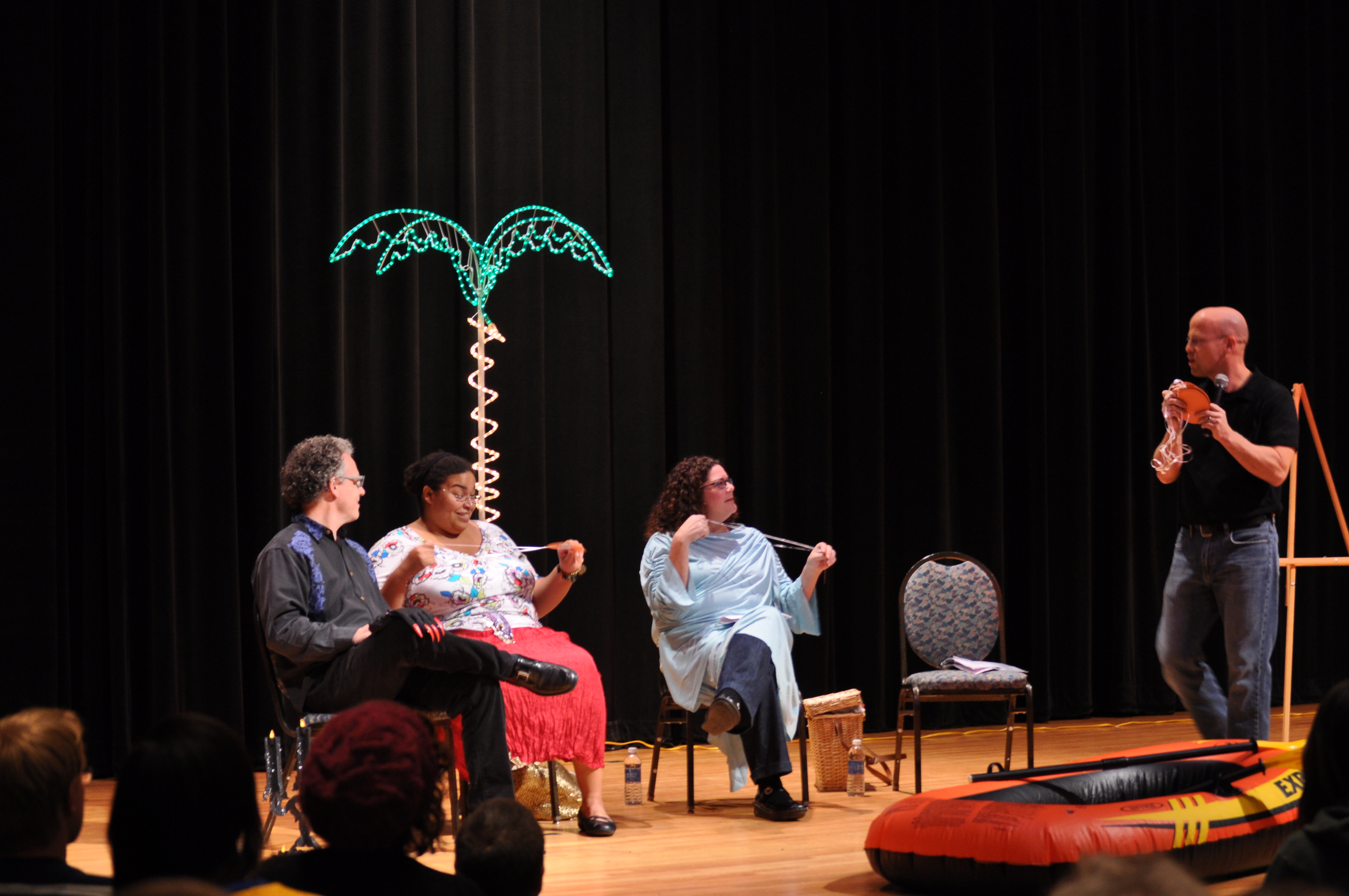What do you get when you combine one witty judge, a devil in disguise and three professors from the College of William and Mary competing for just one spot on a raft off a deserted island? Add in hundreds of cheering students and you’ve got one of the College’s most unique traditions: the annual Raft Debate.
The Raft Debate is a time-honored tradition in which each of three College professors explains why his or her particular field of study is the most beneficial to humanity, and consequently why he or she should be the only one with the opportunity to take the inflatable raft to safety.
Wednesday night, the four participating faculty members of the annual Raft Debate gathered center stage on their makeshift island and argued as to why their area of study deserved the only means of escaping the island — an inflatable raft. Associate Professor Anne Charity Hundley represented the Humanities, Associate Professor Oliver Kerscher defended the natural and computational sciences, Associate Professor Christine Nemacheck spoke on behalf of the social sciences, and Associate Professor Arthur Knight played the role of devil’s advocate.
Draped in a judge’s robe and a snow white periwig adorned with squeaking parrots, Dean of Graduate Studies and Research John Swaddle acted as mediator and judge of the four faculty members as they each gave a seven minute argument. The remaining faculty members had the opportunity to refute and/or disagree with their colleagues in a three-minute rebuttal. After drawing straws, Kerscher began the arguments with a compelling case in which he discussed Alfred Nobel.
“It started with the last will of Alfred Nobel,” he said. “He invented nothing less [than] dynamite and smokeless gunpowder. However, after he asked his lady friend what she thought, she responded ‘That ain’t much of a legacy.’ He decided to use his fortune for good.”
Kerscher awarded his colleagues with gold medals for their respective disciplines’ outstanding contributions to humanity. Humanities received two gold medals, Social Sciences received two gold medals and the Natural Sciences received countless more, several of which Kerscher gave out to members of the audience.
The floor was then opened to the other disciplines for comments, and Charity Hudley had a question about Kerscher’s homemade paper Nobel Prizes.
“Is this a nobel prize or a bootleg penny?” Charity Hudley asked.
Kerscher fired right back.
“I guess you’ve never gotten one,” Kerscher said.
Charity Hudley, in the spirit of debate, fired another shot home.
“I’ve got plenty of pennies but you’re still waiting on your Nobel prize,” she said.
Dressed as Lady Liberty, Nemacheck approached the podium with a speech on the freedoms that the social sciences provide.
“The social sciences help present us with peaceful resolutions for the damage that the other disciplines cause,” she said.
Nemacheck also argued that the social sciences are integral in that they allow the other disciplines to exist, pointing out that you cannot enjoy the humanities without a governing structure.
“Without liberty, beer is no good,” she said.
Putting a spin on the familiar lines of Emma Lazarus’ poem “The New Colossus,” inscribed on the Statue of Liberty, Nemacheck asked the natural and computational sciences to give her their “tired, poor, biologists and chemists / physicists who yearn to breathe free / the wretched refuse on the teeming shore of the computer sciences / send these homeless, jobless, geologist to me…”
She then beckoned the humanities to “give me your tired and really, really, poor artist / your huddled poet yearning to be free, yearning really for anything free / the wretched refuse on religious studies books / and also send those homeless philosophers to me / I lift my lamp beside the golden door.”
Last up was Charity Hudley, who began her speech with a song and dance and then proceeded to explain specifically how all of our lives would change if the humanities didn’t exist at all.
“I am essential,” she said. “The humanities are essential because you are essential. Humanities are how we understand the human condition. How are you going to get your groove on at a silent party?”
She then began to list the mulitple ways that the absence of the humanities would affect other aspects of our lives.
“Medicine without humanities is Viagra,” she said. “Economics without humanities is some broke-ass business. And government without humanities is Fox News.”
Charity Hudley ended her presentation by giving each of her opponents a souvenir. Social Sciences received velvet handcuffs, the judge got an angry bird and the devil got his own “pink slip.”
Finally, it was the devil’s turn — to argue that none of the opponents should be allowed off of the island. Knight closed with a quote that he attributed to his daughter at age three.
“Everyone here is either crazy or dumb,” he said.
He then argued that the devil had already won the debate, because the other three professors had already eaten from the tree of specialized knowledge.
After each faculty member pleaded his or her case, students were given the opportunity to ask the professors questions before the audience’s cheering and applause gauged which discipline would be saved from the deserted island. Although a close race, the humanities — represented by Charity Hudley — won the popular vote of the students; She celebrated by dancing and laughing on stage with her colleagues.
Kristen Hill-Clemons co-wrote this story.

